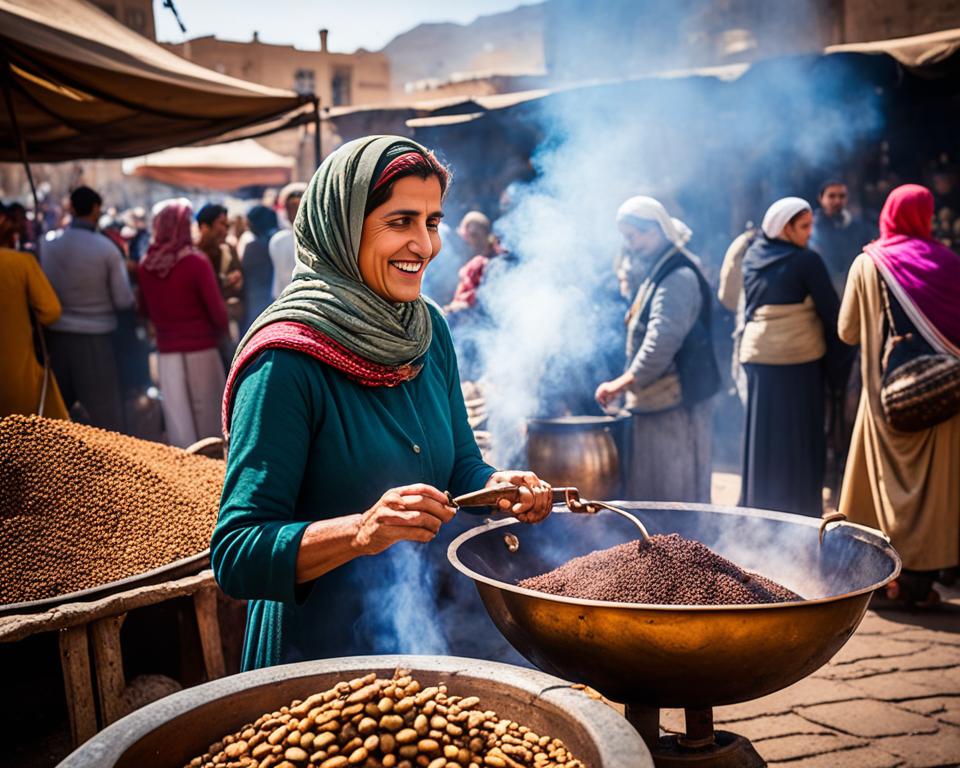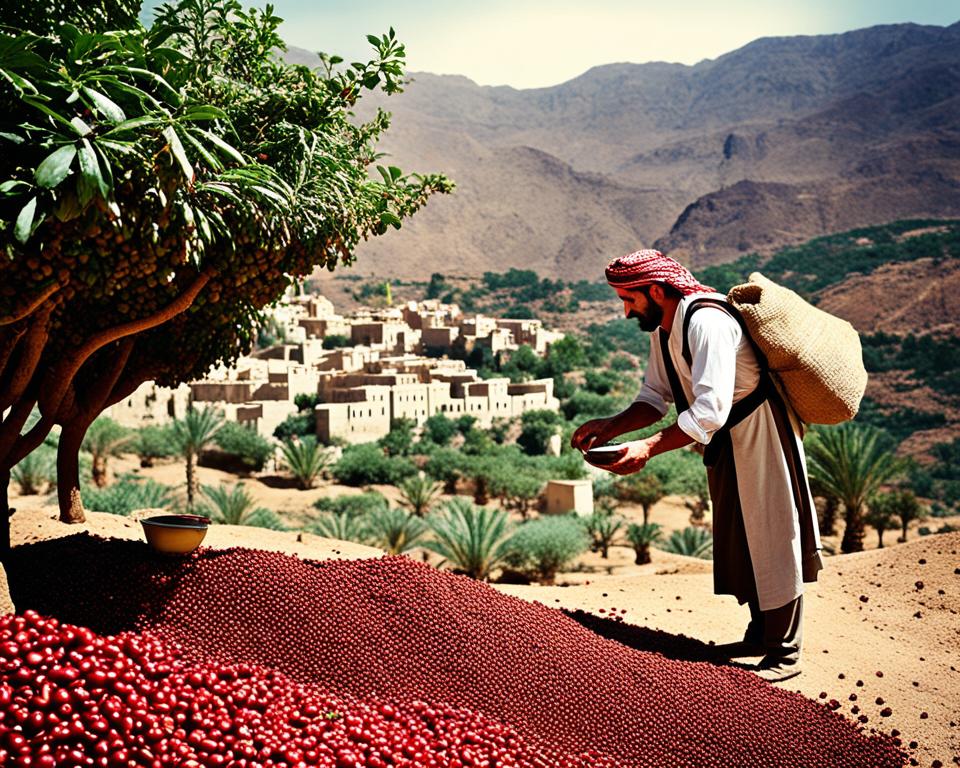The modern coffee industry considers Yemen its home. It was the first place to grow coffee plants for sale. This made a big impact on how the world enjoys coffee today.
Coffee is a key part of Yemen’s culture and daily life. The country’s coffee story goes way back. It includes tales of how coffee growing and making affected society.
Yemen’s beautiful land helps coffee grow. Its mountains and valleys are perfect for coffee plants. For ages, Yemen has been making coffee beans with unique tastes. The journey from local to international coffee stardom is full of stories of creativity and tradition.
Key Takeaways
- Yemen began the modern coffee industry.
- Yemen’s terrain and climate create perfect conditions for coffee cultivation.
- Ancient Yemeni coffee traditions have shaped global coffee culture.
- People around the world love Yemeni coffee beans for their unique flavours.
- Coffee significantly influences Yemen’s cultural identity and daily life.
- Yemen’s coffee history showcases a rich, complex story of innovation and heritage.
The Origins of Yemeni Coffee
The exciting tale of Yemeni coffee starts in the wild terrain of Yemen. This land’s different types of scenery and special climate make it the best spot for growing coffee.
The journey of coffee from local use to a global must-have is both captivating and motivating. Coffee lovers worldwide recognise Yemeni mocha beans for their unique taste.
This specialty coffee from Yemen has become a favorite for those who love coffee.
How Yemeni coffee was discovered
Many old stories and tales tell us that Yemeni coffee first showed up in Yemen’s varied lands. It’s said that a young goat herder named Kaldi found these magical beans first.
He saw that his goats were full of energy after eating coffee cherries. Kaldi then brought the cherries to a nearby monastery.
The monks at the monastery recognised the great use of the beans. They created a drink for them to stay awake during their long prayers, thus beginning the story of Yemeni coffee origins.
This legendary event started a trend that led to the famous Yemeni mocha beans. The beans became popular because of their deep and interesting flavour.
People from local areas to faraway places loved them. The rough land and the special Yemeni climate were perfect for growing these beans. This meant there was always plenty of this special coffee for those who wanted it.
The Role of Yemeni Monks in Popularizing Coffee
The Yemeni monks played a key role in making coffee popular. They noticed how coffee made them feel more awake. So, they started to grow coffee in a careful way.
The methods they used to pick, roast, and make coffee were very good. This helped to make coffee a big deal worldwide.
They started to drink coffee not just for prayers but also during times of fun. These wise monks taught others about making and enjoying coffee.
Today, people still honour the tradition of Yemen’s specialty coffee, like the Yemeni mocha beans, because of them.
These monks made a big difference to coffee around the world. Their actions are a big part of why we love Yemeni coffee today.
The journey from the first Yemeni coffee origins to the coffee we enjoy now shines a light on the deep value and meaning of coffee for Yemen.
Historical Yemen Coffee Beans and Their Cultivation
Yemen’s coffee story is full of history and tradition. People around the world recognise historical Yemen coffee beans for their unique taste.
They are grown using ancient methods, which set them apart around the world.
The Unique Characteristics of Yemeni Coffee Beans
Yemeni coffee beans are special because of their unique growing conditions. They are cultivated in high-altitude areas. This environment gives the beans their rich flavours and hints of fruit and spice.
The coffee in Yemen is mostly from the Arabica type. Over the years, these plants have developed unique flavours.
Traditional Methods of Coffee Cultivation in Yemen
In Yemen, generations of farmers have carefully grown coffee using traditional methods. Farmers grow their coffee on steps in the land, a traditional technique.
They use the sun to dry the coffee cherries, keeping the beans flavorful.
The hard work of the farmers helps the Yemeni coffee industry stay strong. They face modern challenges but continue to grow coffee in their traditional ways.
Tables and data are not used in this part. It focuses on how coffee is grown in Yemen and what makes it special.
How Does the History of Yemen Coffee Compare to the Magic of Ethiopian Yirgacheffe Coffee?
The history of Yemen coffee is rich and complex, tracing back centuries as it spread through trade routes. In contrast, the enchanting flavor profile of ethiopian yirgacheffe coffee magic captivates connoisseurs with its vibrant floral notes and fruity undertones, showcasing the distinct terroir of its homeland, much like Yemen’s ancient traditions.
The Impact of the Yemen Coffee Trade Route
The Yemen Coffee Trade Route has a long history, going back hundreds of years. It was a key part of the global coffee market.
Located on the Arabian Peninsula, Yemen was very important in the development of coffee trading.
Coffee beans from its ancient ports travelled around the world. This helped coffee markets grow into what we see today.
The Development of the Coffee Trade Route
The famous coffee trade started in places like Mocha, Yemen. This city was crucial for the global coffee trade. Mocha connected Yemen’s coffee to Europe and Asia.
This connection helped Yemeni coffee beans gain popularity everywhere.
Yemen’s Influence on the Global Coffee Trade
Yemen had a huge impact on the world’s coffee trade. Its strong coffee industry made Yemeni beans known for their great taste. Records show these beans were shipped globally, creating big demand.
This boosted Yemen’s economy and made it a significant name in coffee history. The trade routes also brought different cultures together, sharing food traditions.
“Yemen’s coffee trade routes were crucial for the world’s coffee economy. They led to global exchange and sharing of culture.”
In summary, the Yemen Coffee Trade Route was very important. It shaped the Yemeni coffee industry and the global coffee trade.
The ideal location of places like Mocha, combined with Yemen’s excellent coffee, kept it central to coffee history for a long time.
The Cultural Significance of Coffee in Yemen
The ancient Yemeni coffee tradition is about more than just making and enjoying coffee. It is a special part of daily life that brings people together. Coffee is at the heart of Yemen’s coffee heritage.
It links with daily life, social events, and religious customs throughout Yemen.
In Yemen, rituals around coffee are a key part of daily life. Families and friends often meet for a coffee ceremony. They share stories and celebrate.
The careful steps of roasting, grinding, and brewing coffee show its value.
“Coffee in Yemen is not just a drink; it is a way of life, a means of welcoming guests and showing hospitality.” – Yemeni Cultural Historian

The role of specialty coffee in Yemen shows a love for top-quality coffee beans. Community coffee houses, known as “Mafraj,” are places where people gather.
They discuss various topics over well-prepared Yemeni coffee. These spots are critical for community building.
Coffee is also important in Yemeni religious life. It’s enjoyed during Ramadan and special religious events to help with prayer and fasting. This enhances its spiritual importance.
The link between coffee and religious rituals shows its communal and thoughtful sides.
Cultural experts and coffee house owners highlight coffee’s deep impact on Yemeni culture. From ceremonies to everyday moments, the Yemen Coffee Heritage shapes the lives of the locals.
FAQ
What is the significance of Yemen’s coffee history?
Yemeni coffee history is very rich and has deep roots. It goes back many centuries. It’s more than just a drink. Coffee and its trade have played a big part in Yemen’s growth and culture. The ancient Yemeni coffee tradition is key to our global love for coffee.
How was Yemeni coffee discovered?
The start of Yemeni coffee was by pure chance. Stories tell of Yemeni monks who first used coffee beans. They realised it kept them awake during prayers. This chance discovery started the worldwide celebration of coffee.
What are the unique characteristics of Yemeni coffee beans?
Yemeni coffee beans are unique in flavor. The land and climate of Yemen bring out this special taste. It’s known for being rich, complex, and strong. Yemeni Mocha beans stand out for their fruity and wine-like flavours.
How is coffee traditionally cultivated in Yemen?
Coffee in Yemen is still grown the old-fashioned way. These include using terraces and picking by hand. This keeps the beans special. Yemeni farmers stick to these traditions, even with modern farming challenges.
What was the Yemen coffee trade route?
The coffee route from Yemen was very important. It helped Yemeni coffee reach the world. Yemeni ports became key stops for coffee and other goods. This trade route shaped global coffee trading.
How has Yemen influenced the global coffee trade?
- Yemen’s coffee trade significantly influenced global coffee trading. By exporting quality beans, Yemen raised the bar. It helped spread coffee farming techniques. Yemen’s ports played a crucial role in the world coffee market and cultural exchange.
What is the cultural significance of coffee in Yemen?
Coffee means a lot in Yemeni culture. It’s tied to their social and religious lives. Drinking coffee is a big part of getting together and sharing stories. The way coffee is made and enjoyed shows Yemen’s deep culture and its connection to coffee.




